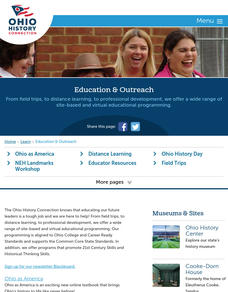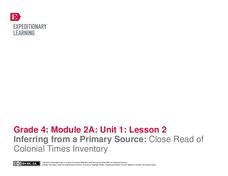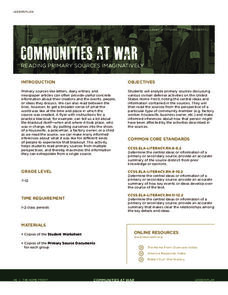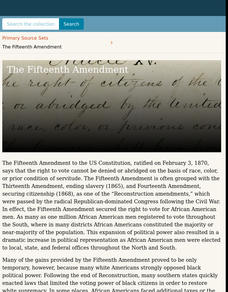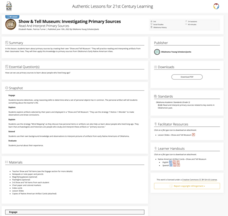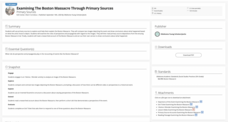PBS
Primary Source Set: Little Women by Louisa May Alcott
What did Jo write her stories with? How did the March sisters dress? A primary source set designed for Louisa May Alcott's Little Women prompts learners to look over images of household items and clothes from the 1860s before...
Briscoe Center for American History
Identifying Primary Source Documents
Who is Mary Maverick and why is she important? the focus of this, the second in a series of five lessons that are designed to introduce middle schoolers to how historians use primary source documents to understand the past, is on...
Curated OER
Using Primary Source Documents
Students examine copies of primary source documents and determine the document's value to a researcher. They analyze and evaluate the document for bias or contradiction. They know the difference between a primary and secondary source.
Curated OER
Reading Primary Source Documents: Comparing Sources
Students analyze and compare various primary source documents. They formulate historical questions based on the documents.
Curated OER
Primary Source Analysis Worksheet
In this Colonial America primary source analysis worksheet, reviewers respond to 5 short answer questions. Although the primary source documents are not included, the questions could be adapted to the analysis of any primary source.
Curated OER
Using Primary Sources: Letters from the Presidents
Students find out about the minds and thoughts of presidents through reading their actual letters. They explore the personal lives of presidents. They answer questions about a primary source. They write essays.
Roy Rosenzweig Center for History and New Media
Continental Differences
Students break into groups and closely investigate primary sources associated with the seven different continents. After deciding which continent their primary sources relate to, representatives from each group present their...
PBS
Using Primary Sources: Nazi Spy Ring Busted
Spy games are not just for professionals anymore! Scholars use short video clips, primary documents, and photographs to investigate Nazi spies in America during World War II. The young detectives analyze the paranoia warfare can...
Center for History Education
Was the Stamp Act Fair?
Pledge your loyalty to the king and the Stamp Act or sign an oath against the tax. After simulating an in-class tax for school supplies, young historians consider the reasons for the Stamp Act and similar colonial policies. The...
Roy Rosenzweig Center for History and New Media
Early English Settlements History Detectives
Young historians play the role of history detectives as they investigate some primary source texts and images related to the early colonization of America, The Jamestown Settlement, and the Mayflower Compact.
EngageNY
Inferring from a Primary Source: Close Read of Colonial Times Inventory
Teach your class about colonial America through an examination of primary documents. First though, start vocabulary notebooks for content-specific and academic vocabulary. Pupils can keep this record during the entire module. Once this...
Thomas Jefferson Foundation
Personal Morals vs. Political Moves Document Based Essay
Was Thomas Jefferson a hypocrite? Tackle this question with primary source analysis and an essay. The packet includes historical background, a writing prompt, a combined outline and checklist, and ten primary documents paired with...
Center for Civic Education
The Power of Nonviolence: What Is Nonviolence? What Does It Cost?
Your young learners will delve into the language of primary source documents in order to identify the characteristics, benefits, and costs of nonviolence. The lesson includes a mix of activities, including an anticipatory activity,...
National WWII Museum
Communities at War: Reading Primary Sources Imaginatively
Uncle Sam wants you to support the troops. Learners use an engaging lesson plan to analyze primary and secondary sources to discover what life was really like for American citizens at home during WWII. Pupils complete...
Humanities Texas
Primary Source Worksheet: Thomas Jefferson, Message to Congress Concerning Louisiana
Proficient reading of informational text, especially primary source documents, requires practice. This message from Thomas Jefferson about the Louisiana Purchase offers readers a chance to develop these comprehension skills.
PBS
Using Primary Sources: Wide Open Town
A picture speaks a thousand words, no matter how old! Scholars use political cartoons from the era of Prohibition and the Temperance Movement to analyze what, a primary document (in this case, a bootlegger's notebook) is telling them...
Digital Public Library of America
Ida B. Wells and Anti-Lynching Activism
A packet of 13 primary sources provides young historians with insight into the anti-lynching activism of civil rights Ida B. Wells. Included are images of Wells, her letters, a political cartoon, newspaper lynching announcements, and a...
Curated OER
Primary Sources and Protagonists: A Native American Literature Unit
Introduce your middle schoolers to the lives of past Native Americans. First, learners work together to put photographs in a sequence. Then, using their sequence, they create stories to share with the whole class. No matter how old your...
Digital Public Library of America
The Fifteenth Amendment
Fifteen primary sources provide a context for a study of the Fifteenth Amendment to the United States Constitution. The packet captures the excitement for the changes promised by the amendment as well as the backlash against it.
Digital Public Library of America
The Adventures of Huckleberry Finn by Mark Twain
Mark Twain's The Adventures of Huckleberry Finn is the focus of a teaching guide that introduces readers to some of the many controversies surrounding the use of the novel in classrooms. The packet includes 15 primary source excerpts and...
K20 LEARN
Show and Tell Museum - Investigating Primary Sources: Read and Interpret Primary Sources
Scholars become detectives in a lesson that focuses on primary sources. Learners practice their observational skills by examining the teacher's artifact and visiting the Show and Tell Museum that highlihgts items from peers and...
PBS
Using Primary Sources: The Rogue's Gallery
What would be in your life's scrapbook? Scholars use short video clips, primary and secondary documents, and photos to investigate a 1909 scrapbook. They analyze and uncover what the Rogue Book tells them about the past in Western...
K20 LEARN
Examining The Boston Massacre Through Primary Sources
The Boston Massacre is the focus of a lesson that explores primary sources. Scholars examine two primary source images and discuss the different perspectives on the historical event. After groups read a researched account, they perform a...
EngageNY
Mid-Unit Assessment: Classifying and Evaluating Primary Sources
Let's take a walk—a gallery walk. Scholars complete a mid-unit assessment relating to Unbroken by taking a gallery walk to view the various primary source mediums. They then use organizers to select three sources and respond to...
Other popular searches
- Using Primary Sources
- Wwi, Primary Sources
- Rosa Parks Primary Documents
- Gilded Age Primary Sources
- Working With Primary Sources
- Primary Resources Hsie
- Web Quests Primary Sources
- Ancient Rome Primary Sources
- 1920 1929 Primary Sources
- Primary Sources and Family
- Conscription Primary Sources
- Scotland Primary Sources




